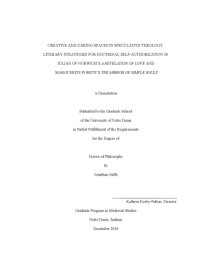
Ebook: Creative and daring spaces in speculative theology: Literary strategies for doctrinal self-authorization in Julian of Norwich’s “A Revelation of Love” and Marguerite Porete’s “The Mirror of Simple Souls”
Author: Jonathan Juilfs
- Tags: Philosophy religion and theology, Language literature and linguistics, Heresy, Julian of Norwich, Late-medieval England, Late-medieval France, Mirror of Simple Souls, Mystical, Porete Marguerite, Revelation of Love, Vernacular mysticism, Visionary literature
- Year: 2011
- Publisher: University of Notre Dame
- Language: English
- pdf
In the cases of the two remarkable late-medieval women who are the primary subjects of this dissertation, Julian of Norwich and Marguerite Porete, I have sought to understand more comprehensively both where the Bible appears in their texts, whether by direct citation or less overt allusion, and what larger impact biblical texts may have on the larger organization and structural features of their texts. Through detailed examination of the roles which biblical language plays in Julian‘s Revelation of Love and Marguerite‘s Mirror of Simple Souls, I argue that the culturally-assumed limitations of medieval women‘s capacities to understand the Bible were not only erroneous but also gave way to original and insightful interpretations of various scriptural passages that serve strategically well the broader theological and rhetorical aims of both writers. Biblical citations or allusions do not appear in A Revelation or in The Mirror simply as external defenses of doctrinal claims (i.e. a proof-texts); instead, they function organically in the bodies of the texts, offering conceptual "seeds" that, when nurtured by divine insight (as transmitted through Julian's vision and Marguerite's mystical experience) and personal reflection, germinate into identifiable structures of thought. Both women thus cleverly mold scriptural and scripture-like narratives to fit the contours of their respective speculative theologies. These rhetorical acts of self-authorization, by reference to or engagement with the supreme authority of the Church, illuminate the adroitness of both to navigate the seemingly un-navigable paradoxes of their respective claims, as women, to visionary or mystical authority.
Such textual and conceptual comparisons between Julian's Revelation and Marguerite's Mirror are instructive because they travel together (The Mirror in Middle English translation) in one surviving fifteenth-century manuscript, an historical curiosity that suggests that at least one Carthusian compiler read or heard thematic relationships between the two textual traveling companions. Such a rare opportunity for comparative investigation of two very sophisticated texts ultimately renders various insights into how two clever, female interpreters of Scripture in the later Middle Ages elaborated on and challenged popular orthodoxies currently circulating among both the laity and the clergy of the late-medieval Church.
Such textual and conceptual comparisons between Julian's Revelation and Marguerite's Mirror are instructive because they travel together (The Mirror in Middle English translation) in one surviving fifteenth-century manuscript, an historical curiosity that suggests that at least one Carthusian compiler read or heard thematic relationships between the two textual traveling companions. Such a rare opportunity for comparative investigation of two very sophisticated texts ultimately renders various insights into how two clever, female interpreters of Scripture in the later Middle Ages elaborated on and challenged popular orthodoxies currently circulating among both the laity and the clergy of the late-medieval Church.
Download the book Creative and daring spaces in speculative theology: Literary strategies for doctrinal self-authorization in Julian of Norwich’s “A Revelation of Love” and Marguerite Porete’s “The Mirror of Simple Souls” for free or read online
Continue reading on any device:

Last viewed books
Related books
{related-news}
Comments (0)